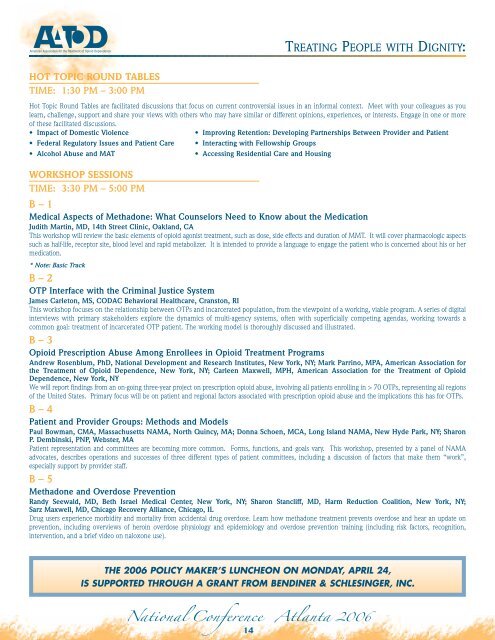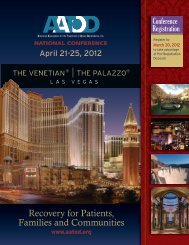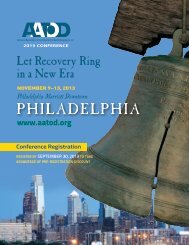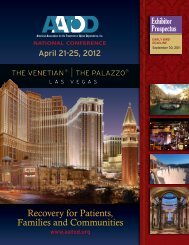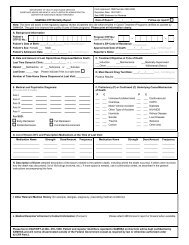AATOD 2006 Conference Registration Brochure
AATOD 2006 Conference Registration Brochure
AATOD 2006 Conference Registration Brochure
You also want an ePaper? Increase the reach of your titles
YUMPU automatically turns print PDFs into web optimized ePapers that Google loves.
American Association for the Treatment of Opioid Dependence<br />
TREATING PEOPLE WITH DIGNITY:<br />
HOT TOPIC ROUND TABLES<br />
TIME: 1:30 PM – 3:00 PM<br />
Hot Topic Round Tables are facilitated discussions that focus on current controversial issues in an informal context. Meet with your colleagues as you<br />
learn, challenge, support and share your views with others who may have similar or different opinions, experiences, or interests. Engage in one or more<br />
of these facilitated discussions.<br />
• Impact of Domestic Violence<br />
• Improving Retention: Developing Partnerships Between Provider and Patient<br />
• Federal Regulatory Issues and Patient Care • Interacting with Fellowship Groups<br />
• Alcohol Abuse and MAT<br />
• Accessing Residential Care and Housing<br />
WORKSHOP SESSIONS<br />
TIME: 3:30 PM – 5:00 PM<br />
B – 1<br />
Medical Aspects of Methadone: What Counselors Need to Know about the Medication<br />
Judith Martin, MD, 14th Street Clinic, Oakland, CA<br />
This workshop will review the basic elements of opioid agonist treatment, such as dose, side effects and duration of MMT. It will cover pharmacologic aspects<br />
such as half-life, receptor site, blood level and rapid metabolizer. It is intended to provide a language to engage the patient who is concerned about his or her<br />
medication.<br />
* Note: Basic Track<br />
B – 2<br />
OTP Interface with the Criminal Justice System<br />
James Carleton, MS, CODAC Behavioral Healthcare, Cranston, RI<br />
This workshop focuses on the relationship between OTPs and incarcerated population, from the viewpoint of a working, viable program. A series of digital<br />
interviews with primary stakeholders explore the dynamics of multi-agency systems, often with superficially competing agendas, working towards a<br />
common goal: treatment of incarcerated OTP patient. The working model is thoroughly discussed and illustrated.<br />
B – 3<br />
Opioid Prescription Abuse Among Enrollees in Opioid Treatment Programs<br />
Andrew Rosenblum, PhD, National Development and Research Institutes, New York, NY; Mark Parrino, MPA, American Association for<br />
the Treatment of Opioid Dependence, New York, NY; Carleen Maxwell, MPH, American Association for the Treatment of Opioid<br />
Dependence, New York, NY<br />
We will report findings from an on-going three-year project on prescription opioid abuse, involving all patients enrolling in > 70 OTPs, representing all regions<br />
of the United States. Primary focus will be on patient and regional factors associated with prescription opioid abuse and the implications this has for OTPs.<br />
B – 4<br />
Patient and Provider Groups: Methods and Models<br />
Paul Bowman, CMA, Massachusetts NAMA, North Quincy, MA; Donna Schoen, MCA, Long Island NAMA, New Hyde Park, NY; Sharon<br />
P. Dembinski, PNP, Webster, MA<br />
Patient representation and committees are becoming more common. Forms, functions, and goals vary. This workshop, presented by a panel of NAMA<br />
advocates, describes operations and successes of three different types of patient committees, including a discussion of factors that make them “work”,<br />
especially support by provider staff.<br />
B – 5<br />
Methadone and Overdose Prevention<br />
Randy Seewald, MD, Beth Israel Medical Center, New York, NY; Sharon Stancliff, MD, Harm Reduction Coalition, New York, NY;<br />
Sarz Maxwell, MD, Chicago Recovery Alliance, Chicago, IL<br />
Drug users experience morbidity and mortality from accidental drug overdose. Learn how methadone treatment prevents overdose and hear an update on<br />
prevention, including overviews of heroin overdose physiology and epidemiology and overdose prevention training (including risk factors, recognition,<br />
intervention, and a brief video on naloxone use).<br />
THE <strong>2006</strong> POLICY MAKER’S LUNCHEON ON MONDAY, APRIL 24,<br />
IS SUPPORTED THROUGH A GRANT FROM BENDINER & SCHLESINGER, INC.<br />
National <strong>Conference</strong> Atlanta <strong>2006</strong><br />
14


